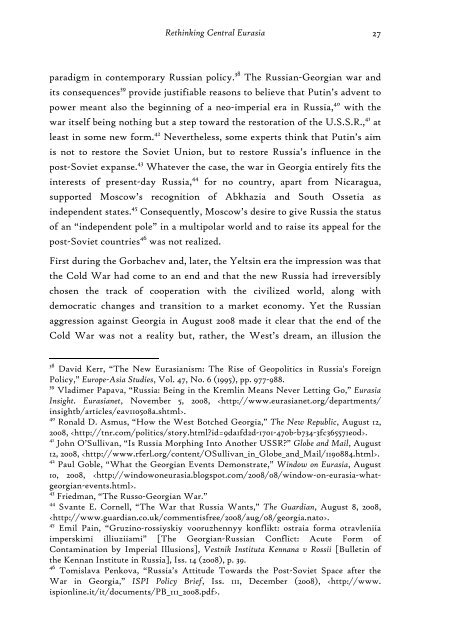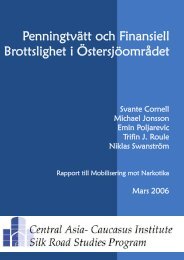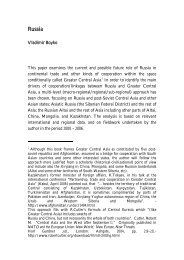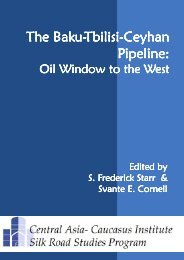Eurasianism and the Concept of Central Caucaso-Asia
Eurasianism and the Concept of Central Caucaso-Asia
Eurasianism and the Concept of Central Caucaso-Asia
Create successful ePaper yourself
Turn your PDF publications into a flip-book with our unique Google optimized e-Paper software.
Rethinking <strong>Central</strong> Eurasia 27<br />
paradigm in contemporary Russian policy. 38 The Russian-Georgian war <strong>and</strong><br />
its consequences 39 provide justifiable reasons to believe that Putin’s advent to<br />
power meant also <strong>the</strong> beginning <strong>of</strong> a neo-imperial era in Russia, 40 with <strong>the</strong><br />
war itself being nothing but a step toward <strong>the</strong> restoration <strong>of</strong> <strong>the</strong> U.S.S.R., 41 at<br />
least in some new form. 42 Never<strong>the</strong>less, some experts think that Putin’s aim<br />
is not to restore <strong>the</strong> Soviet Union, but to restore Russia’s influence in <strong>the</strong><br />
post-Soviet expanse. 43 Whatever <strong>the</strong> case, <strong>the</strong> war in Georgia entirely fits <strong>the</strong><br />
interests <strong>of</strong> present-day Russia, 44 for no country, apart from Nicaragua,<br />
supported Moscow’s recognition <strong>of</strong> Abkhazia <strong>and</strong> South Ossetia as<br />
independent states. 45 Consequently, Moscow’s desire to give Russia <strong>the</strong> status<br />
<strong>of</strong> an “independent pole” in a multipolar world <strong>and</strong> to raise its appeal for <strong>the</strong><br />
post-Soviet countries 46 was not realized.<br />
First during <strong>the</strong> Gorbachev <strong>and</strong>, later, <strong>the</strong> Yeltsin era <strong>the</strong> impression was that<br />
<strong>the</strong> Cold War had come to an end <strong>and</strong> that <strong>the</strong> new Russia had irreversibly<br />
chosen <strong>the</strong> track <strong>of</strong> cooperation with <strong>the</strong> civilized world, along with<br />
democratic changes <strong>and</strong> transition to a market economy. Yet <strong>the</strong> Russian<br />
aggression against Georgia in August 2008 made it clear that <strong>the</strong> end <strong>of</strong> <strong>the</strong><br />
Cold War was not a reality but, ra<strong>the</strong>r, <strong>the</strong> West’s dream, an illusion <strong>the</strong><br />
38 David Kerr, “The New <strong>Eurasianism</strong>: The Rise <strong>of</strong> Geopolitics in Russia's Foreign<br />
Policy,” Europe-<strong>Asia</strong> Studies, Vol. 47, No. 6 (1995), pp. 977-988.<br />
39 Vladimer Papava, “Russia: Being in <strong>the</strong> Kremlin Means Never Letting Go,” Eurasia<br />
Insight. Eurasianet, November 5, 2008, .<br />
40 Ronald D. Asmus, “How <strong>the</strong> West Botched Georgia,” The New Republic, August 12,<br />
2008, .<br />
41 John O’Sullivan, “Is Russia Morphing Into Ano<strong>the</strong>r USSR?” Globe <strong>and</strong> Mail, August<br />
12, 2008, .<br />
42 Paul Goble, “What <strong>the</strong> Georgian Events Demonstrate,” Window on Eurasia, August<br />
10, 2008, .<br />
43 Friedman, “The Russo-Georgian War.”<br />
44 Svante E. Cornell, “The War that Russia Wants,” The Guardian, August 8, 2008,<br />
.<br />
45 Emil Pain, “Gruzino-rossiyskiy vooruzhennyy konflikt: ostraia forma otravleniia<br />
imperskimi illiuziiami” [The Georgian-Russian Conflict: Acute Form <strong>of</strong><br />
Contamination by Imperial Illusions], Vestnik Instituta Kennana v Rossii [Bulletin <strong>of</strong><br />
<strong>the</strong> Kennan Institute in Russia], Iss. 14 (2008), p. 39.<br />
46 Tomislava Penkova, “Russia’s Attitude Towards <strong>the</strong> Post-Soviet Space after <strong>the</strong><br />
War in Georgia,” ISPI Policy Brief, Iss. 111, December (2008), .






